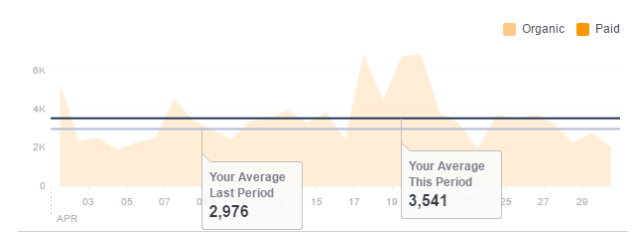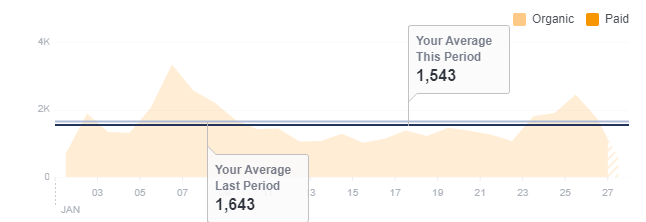In this blog series, we will be discussing organic reach and how it has been declining (or not) for business pages on the 4 major social media platforms: Facebook, Instagram, LinkedIn, and Twitter. In part one, we’ll take a look at Facebook and how the implementation of algorithms have affected organic reach for all business pages.
First, you may be wondering what organic reach actually is. Put simply, organic reach refers to how well a page’s post performs without putting any ad money behind it. On Facebook, reach is the “number of unique users who had any content from your Facebook Page or about your Page enter their screen.” Facebook’s organic reach includes fans of your page that see your content in their feed, users (who are not fans) who see mentions of your profile in their feed, and users that see your pictures or albums.
A Quick History
The social media networking site known as Facebook was founded in 2004 and grew to be the largest social network in the world by 2012, boasting over one billion users.
It was in February of 2012 that Facebook made the biggest and most impactful change to its algorithm. Before 2012, it was easy for brands to reach their audiences organically (for free) on the platform. After the algorithm adjustment, however, average organic reach dropped from 16% to 6.5%. So, a page with 10,000 fans could expect around 650 fans to actually see their posts in fans’ feeds.
Since then, Facebook has continued to adjust the algorithm to prioritize posts from users’ friends over that of business pages.
Wait, What’s an Algorithm?
Facebook’s algorithms are calculations the platform uses to decide what content each user sees. It has replaced a chronological feed on every social media platform to date.
Why Is Organic Reach Declining?
The decline in organic reach is only partly due to the algorithm changes. We can also attribute it to the fact that there are too many business pages and other accounts producing way too much content. Competition for visibility on Facebook is high, so Facebook took matters into their own hands to try to ensure that users only see the best content that is the most relevant to their interests.
Here’s a look at what declining reach looks like for one account over a 34-month period.
In April of 2017, the page had 10,422 fans, and the organic reach for a period of one month was 3,541.

As of January 2020, the page has 15,253 fans, and the organic reach for a period of one month was 1,543.

That is a 56.4% decline in reach despite a 46.3% increase in the number of fans! The page consistently grew its fan base, posted relevant organic content, and utilized a monthly social ads budget; yet, organic reach still dropped drastically.
Does Organic Reach Matter Anymore?
You may have heard marketers say that because organic reach has declined so much and because paid reach has increased, that there’s no need for organic content anymore. That, however, is not the case.
Though paid reach does give you the ability to ensure your content reaches your target audience and generate awareness for your business, organic content is still a crucial part of any social media marketing strategy.
Organic content gives businesses the opportunity to build relationships, and turn followers into customers, repeat customers, and loyal brand advocates. It’s all about posting content that is relevant and share-worthy, and interacting with your followers online!
Don’t Rely Fully on Organic!
A winning social media strategy won’t rely on paid-only or organic-only posts. Just like posting consistent organic content is important, so is having a social ads budget. Use your social ads budget to create quality Facebook ads and sponsored posts that are properly targeted to the audience you most want to reach. Paid content will also help your organic content to thrive by bringing new users to your page.

